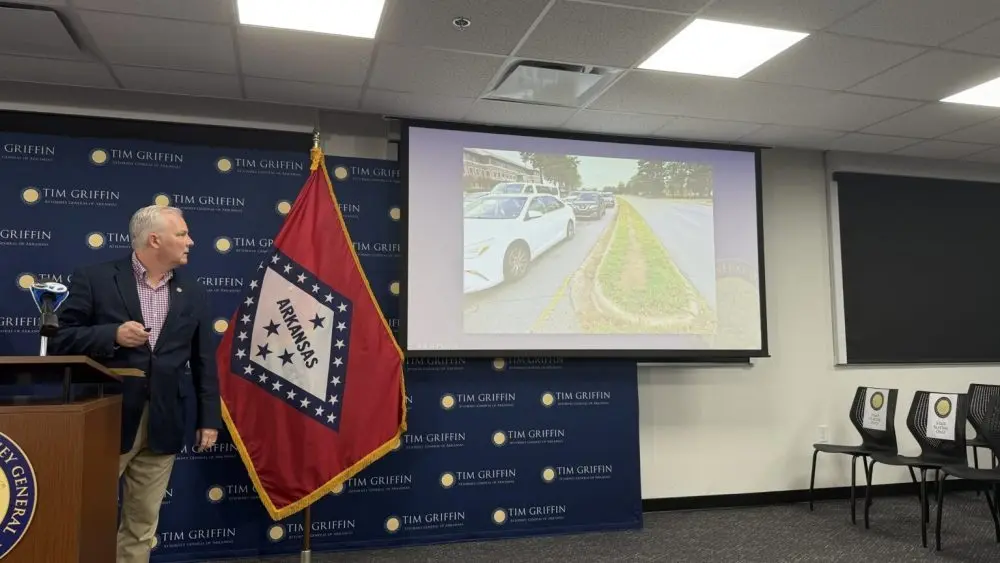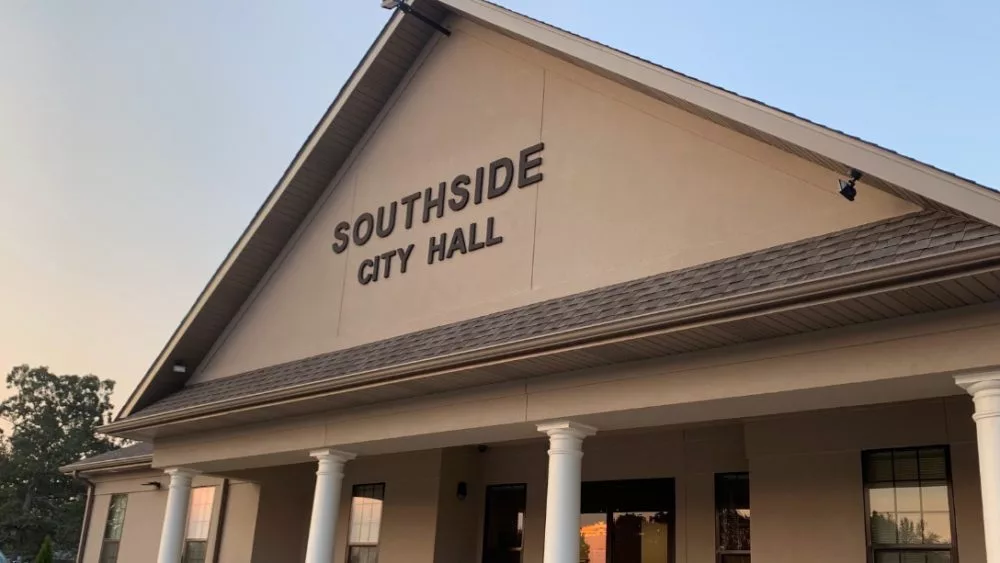Arkansas Attorney General Tim Griffin discusses what he described as unsafe loitering at a press conference on July 10, 2025. Displayed on the screen is a picture of the grass median just west of the intersection between Chenal Parkway and Markham Street in Little Rock. (Ainsley Platt/Arkansas Advocate)
By Ainsley Platt, Arkansas Advocate
Arkansas Attorney General Tim Griffin criticized municipalities for not doing more to curb what he characterized as unsafe loitering during a press conference Thursday.
Griffin called on city and county officials to do more to enforce Act 255 of 2023, an anti-loitering law that replaced a law targeting panhandlers that was struck down by a federal judge in 2020 for violating the First Amendment.
(Scroll down to read his complete statement below.)
Under the act, anyone who “lingers or remains” on a sidewalk, road or parking lot in a manner that is “harassing or threatening,” is “likely to cause alarm,” or “create[s] a traffic hazard or impediment” could be charged with a misdemeanor, punishable by up to 30 days in prison and $500 fine if found guilty.
“This is the sort of thing that is the responsibility of cities and counties and communities, not the attorney general’s office, but I will be a backstop,” Griffin warned. “If this is not fixed, I’m going to take action myself.”
“When you have people that close to the road with signs, people are reading the signs, or they’re slowing down, or they’re stopping in the middle of the road, even when the light’s green and they’re passing things out of their car, and they’re causing a hazard,” the AG said.
Griffin rotated through slides displaying images of individuals standing near busy intersections around Little Rock, oftentimes with signs asking for monetary assistance. The attorney general said he lives near Cantrell Road, which often sees individuals standing on concrete medians or the side of the road asking for money.
“Some of these individuals have been seen parking their truck down the street, down the block, and then they walk down, and they do this every single day,” Griffin said. “This is where they go for their daily job, or whatever you want to call it.”
Megan Bailey, a spokesperson for the ACLU of Arkansas, which filed the lawsuit that eventually led to the state’s 2017 anti-loitering law to get struck down, said the state has “a long and shameful history” of using such laws to “criminalize poverty and silence vulnerable people.” Bailey called Griffin’s demand for increased enforcement of Act 255 “a dangerous step backward that risks violating Arkansans’ constitutional rights.”
“Courts across the country, including here in Arkansas, have repeatedly struck down broad anti-loitering and anti-panhandling laws as unconstitutional,” Bailey wrote in an emailed statement. “That’s because these laws aren’t really about safety; they’re about pushing poor people out of public view.”
Griffin said the issue isn’t that these individuals are asking for money — it’s that they are creating what he described as a safety hazard because they’re putting themselves at risk of getting hit by a car and are distracting drivers.
“When you have people that close to the road with signs, people are reading the signs, or they’re slowing down, or they’re stopping in the middle of the road, even when the light’s green and they’re passing things out of their car, and they’re causing a hazard,” he said.
According to Arkansas code 27-51-104, it is illegal for drivers to drive “too close to or colliding with parked or stopped vehicles, fixtures, persons, or objects adjacent to the public thoroughfares” or “to operate a vehicle in any manner when the driver is inattentive and such inattention is not reasonable and prudent in maintaining vehicular control.”
Griffin told the Advocate that what constitutes a traffic hazard or impediment in line with the law is a “judgement call based on the particular circumstances.”
“If you’re 100 feet from a road, you’re not a traffic hazard. If you’re hanging out into the road, I would say that’s a traffic hazard. If you’re standing like this,” Griffin said, scrunching up his shoulders and gesturing to indicate cars passing by, “with cars going by on a strip about two feet, that’s probably a traffic hazard.”
Griffin said that cities cannot be top-notch “with this kind of nonsense going on.”
“You can’t be a first-class city, a first-class community, with this kind of stuff going on,” Griffin said, displaying a slide showing trash that he claimed was left behind by such individuals.
Bailey had a different perspective.
“The government cannot arrest the state’s way out of poverty, and it certainly can’t police people into invisibility,” she said. “Real public safety means access to housing, healthcare, and support — not criminal citations and jail time for simply existing in public.”
Aaron Sadler, a spokesperson for the city of Little Rock, which was featured in many of the photos shown by Griffin, said the city’s police department works “tirelessly” to enforce laws at all levels of government. He said the city had confidence in the abilities of local and state law enforcement to protect motorists and pedestrians in Little Rock.
“Every day, LRPD [Little Rock Police Department] meets and exceeds its responsibilities to uphold the law and keep residents and guests safe,” Sadler said in a text message.
Attorney General Tim Griffin’s statement from July 10, 2025, on enforcing Act 255 of 2023:
“Loitering in and around public roadways, intersections, and traffic stops has grown to an unacceptable level. Anyone who has spent time in Arkansas’s larger municipalities over the past few years has undoubtedly had to watch out for people walking into the street, putting everyone’s safety at risk. Residents of our cities routinely drive by intersections, sidewalks, and parking lots where people have left all kinds of trash behind after loitering there for hours.
“We have a law that addresses this, but it’s not being enforced. So today I am calling on local law enforcement, and municipal and county leaders to begin enforcing our state’s loitering statute. Act 255 of 2023 fixed the previous constitutional issues with the statute by removing the language at issue, and our law now prohibits individuals from loitering in a harassing or threatening manner, in a way likely to cause alarm to another person, or under circumstances that create a traffic hazard or impediment. This law is constitutionally sound, and local law enforcement should enforce it.
“Federal courts have established that panhandling, by itself, is protected by the First Amendment, and I absolutely respect those decisions. It’s one thing to simply ask people for help. It’s a very different thing to ignore and disregard the laws that keep our streets safe and orderly.
“My office stands ready to help enforce our loitering statute.”
The Arkansas Advocate is a nonprofit, nonpartisan news organization dedicated to tough, fair daily reporting and investigative journalism that holds public officials accountable and focuses on the relationship between the lives of Arkansans and public policy.
Have a news tip or event to promote? Email White River Now at news@whiterivernow.com. Be sure to like and follow us on Facebook and Twitter. And don’t forget to download the White River Now mobile app from the Google Play Store or the Apple App Store.
Get up-to-date local and regional news/weather from the First Community Bank Newsroom on Arkansas 103.3 KWOZ every weekday morning and afternoon. White River Now updates are also aired on weekday mornings on
93 KZLE, Outlaw 106.5, and Your FM 99.5. Catch CBS News around the top of every hour on 1340 KBTA.







